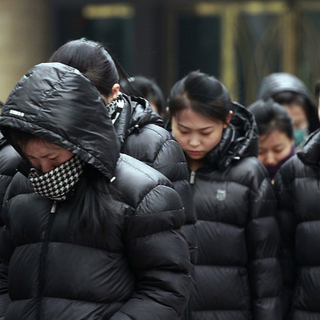


North Koreans are used as modern slaves in China's fish processing plants
InvestigationJournalists from The Outlaw Ocean Project have found that Chinese companies are employing North Koreans, despite UN sanctions. Mostly women, they work in awful conditions and are often sexually assaulted.
In February 2023, Donggang Jinhui Food, a seafood processing company located in Dandong, China – on the border with the Democratic People's Republic of Korea (DPRK) – held a big party to celebrate a banner year: The company had inaugurated a new plant in the city and doubled its squid exports to the US. Videos of the event posted on Douyin (the Chinese version of TikTok) showed singers, musicians, dancers, fireworks and strobe lights.
A crucial element behind Donggang Jinhui Food's success is its use of North Korean labor, sent by Pyongyang to Chinese factories – a labor force that can be exploited and cut at will, and one that enables internationally-isolated North Korea to receive much-needed foreign currency. Videos released by the Chinese company showed machines with instructions in Korean and workers explaining, also in Korean, how to clean and weigh squid. At the February 2023 celebration, pop songs popular in Pyongyang were played, including "People Bring Glory to Our Party" (written by North Korea's 1989 poet laureate) and "We Will Go to Mount Paektu" (a reference to the widely mythologized birthplace of Kim Jong-il, the country's leader from 1994 to 2011). In the audience, dozens of workers danced to the music, clapping and waving miniature North Korean flags.
One of the videos shown at the event also featured drone footage of the company's 10.5-hectare walled compound, which includes processing facilities, cold storage warehouses and six-story dormitories for workers. It also highlighted the company's expansion into the Western market and featured a wide range of Western certifications, issued by certifying bodies such as the Marine Stewardship Council (MSC) and Sedex – which are supposed to check workplaces for abuses. A trader working with the Chinese company estimated that it currently employs somewhere between 50 and 70 North Korean workers. The performers at the party wore DPRK colors, with the country's flag flying behind them. When the footage was posted online, one commenter – who was probably baffled, as Chinese companies' employment of North Korean labor violates United Nations (UN) sanctions – asked: "Aren't you prohibited from filming this?" Jinhui did not respond to requests for comment.
Part of their wages seized
Like many others, Jinhui's plants depend on a vast North Korean labor transfer program. The program is run by a secretive agency of the North Korean government called "Room 39," which oversees overseas activities: Counter-espionage, dispatching assassins, money laundering, the development of nuclear and ballistic missile programs, cyberattacks, etc. North Korea began sending significant numbers of workers to China in 2012: That year, over 40,000 workers were granted special visas. The North Korean government seizes part of their wages to fund Room 39 activities, and also to provide a vital source of foreign currency for party officials. In 2017, the UN estimated that the program earned the country between $1.2 and $2.3 billion (€1.1 and €2.1 billion) a year.
You have 89.32% of this article left to read. The rest is for subscribers only.
